New cervical cancer screening guidelines say no Pap tests for women under 21
(CBS News) The United States Preventive Services Task Force (USPSTF) released new cervical cancer screening guidelines today that recommend women ages 21 to 65 get a pap smear test every 3 years. For women under the age of 21, the task force does not recommend testing at all, even if they are sexually active.
Women ages 30 to 65 can prolong screening to every five years if they get a HPV test with it.
The guidelines, published online in the the March 14 issue of Annals of Internal Medicine, also say that women under 30 should not be screened for HPV. Many benign infections that would go away on their own are found and could potentially cause more harm than good if caught, the task force said.
"It is as effective in reducing cancer deaths as annual screening but we have substantially less false positive tests," task force member Dr. Wanda Nicholson, associate professor of gynecology and obstetrics at the University of North Carolina, Chapel Hill School of Medicine, told CBS News.
Cervical cancer study shows Pap tests boost survival chancesHPV tests "better" than Pap smear at cervical cancer detection
However, not all doctors agree. "To blanketly say in these low risks patients 5 years is appropriate might be a stretch too far," said Dr. Sharyn Lewin, an OB/GYN at NY Presbyterian-Columbia University Medical Center in New York City told CBS News. She doesn't think women should skip the annual checkup because it also includes important conversations about sexual health.
Another set of guidelines from the American Cancer Society recommends that all women should begin cervical cancer testing three years after they become sexually active or after the age of 18 and no later than 21. A regular Pap test is recommended every year; a liquid-based Pap test only needs to be run every 2 years. Yearly testing is also recommended for women with more risk factors like a family history or weakened immune system.
If a woman over 30 had three normal Pap tests in a row or couples her test with a HPV DNA test , the American Cancer Society says the woman can get tested every 3 years. Women over 70 who have had 3 or more normal Pap tests in a row and no abnormal results for 10 years can opt not to get tested. Also, women who have had their cervix removed unless it was a result of cervical cancer or pre-cancer need not be tested.
More than 12,100 American women will be diagnosed with cervical cancer and another 4,220 will die from the disease this year, according to the National Cancer Institute.
The reason why screening is not recommended for women under 21, according to Otis Brawley, chief medical officer of the American Cancer Society, is because a positive HPV test can lead to treatment that may cause a condition caused cervical incompetence or miscarriage years later. He wrote on CNN that most HPV infections that are not treated go away within nine months without any effects. Cervical cancer is a slow growing disease, and can take more than a decade to turn from HPV to cervical cancer, he said.
Brawley points out that the majority of women who die from cervical cancer hadn't been screened, and most of those who had been screened had done so 10 years before their diagnosis.
HealthPop reported this month that women are more likely to survive cervical cancer if diagnosed with a pap smear. Women whose cancer was found through the test had a 92 percent cure rate, while women who were diagnosed because of symptoms had a 66 percent cure rate.
That's something that all organizations agree on, including the task force.
"We need to get the women who have not had a Pap smear in the past five years in," Dr. Virginia Moyer, chair of the USPSTF and pediatrician at Baylor College of Medicine and Texas Children's Hospital in Dallas, told Reuters Health. "The women who aren't getting screened at all, that's the tragedy."
